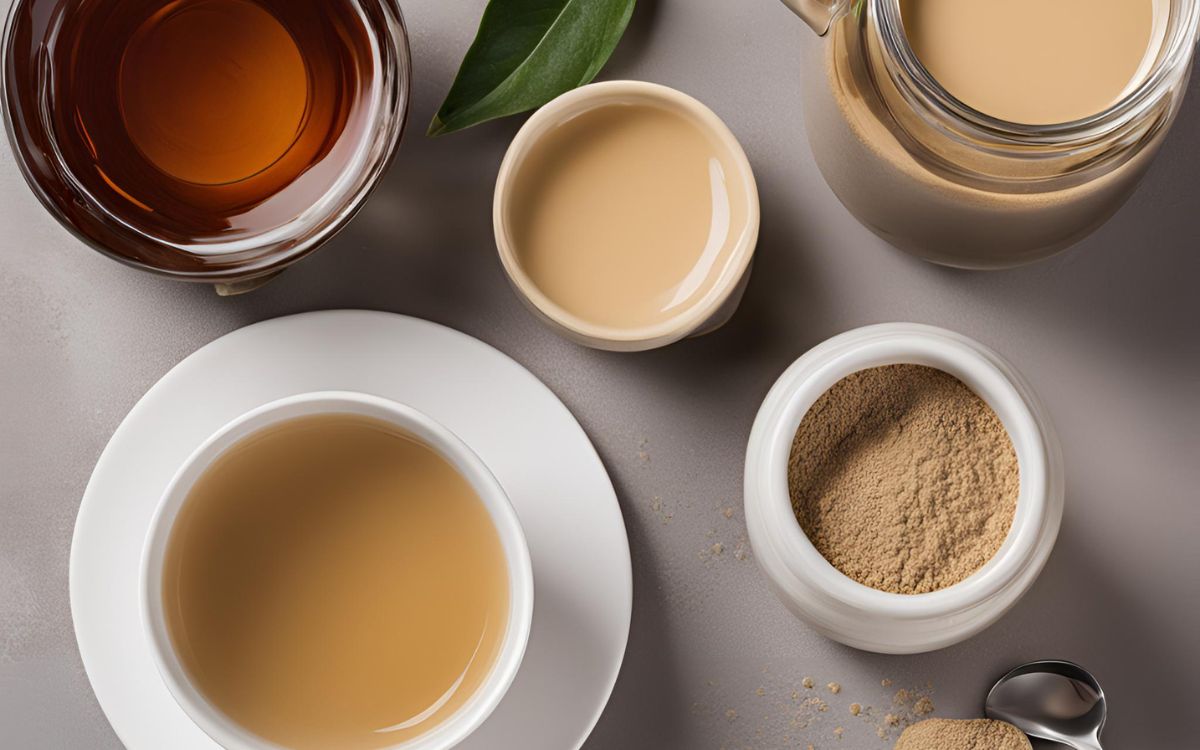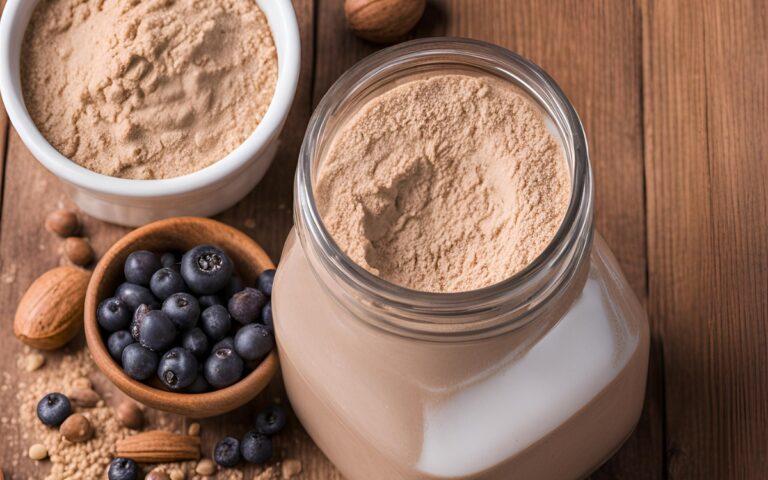Can You Put Protein Powder in Tea?
When wanting to improve their intake of protein, athletes and fitness enthusiasts frequently use protein powder as a supplement. But can you put protein powder in tea?
Yes, you can boost your metabolism by adding protein powder to your milk, coffee, or tea.
Protein powder is another ingredient that you may add to your beverage; just make sure to stir it in while it’s still at room temperature.
Key Takeaway

Types Of Protein Powder
Before jumping into the question “Can you put protein powder in tea”, let’s have a look at some of the protein powders available.
- Whey
Whey protein is a water-soluble byproduct of cheese production that contains a wealth of essential proteins for the body.
It is highly helpful in achieving specific objectives, such as reaching the daily allotment of protein, preventing fat growth, preventing muscle loss, and enhancing bodily resistance during strenuous activity.
This is available in a variety of flavours, including vanilla and chocolate.
Branch-chain amino acids (BCAA), which are crucial for rebuilding and mending muscle damage resulting from strenuous exercise, are plentiful in all four types of whey powders.
The four types of whey powders that are available are isolation, concentrate, hydrolysate, and native.
- Hemp
A further Source of whole protein is hemp seeds, which provide all the necessary BCAAs that are composed of the vital fatty acids required by the body. Most people who are lactose intolerant or vegan use this.
It has almost as many proteins as lamb and beef. Hemp seeds provide eleven grammes of protein in two to three teaspoons.
This protein source is also hypoallergenic and high in fibre, and it comes from the cannabis plant’s seed rather than the dangerous psychoactive ingredient.
- Soy
It is advised to substitute soy for dairy ingredients like whey or casein. Soybeans are used to make this. There are 23 grammes of protein in one ounce of soy powder.
It has a high protein content, but it also has phytates, which prevent the body from absorbing minerals.
- Casein
Glutamate-rich amino acids found in casein are what help muscles recover more quickly from strenuous exercises or other activities.
It is ideal to take this dairy product, which has a slow digestion rate, every night before working out.
This contains nearly all of the nutrients required for your muscles to heal and regenerate since it is primarily made of cow’s milk.
- Pea
Another excellent, flavourless plant-based supplement that works well in place of soy and dairy-based protein is pea.
Allergens such as eggs, nuts, cow’s milk, wheat, soy, and shellfish are not present in this vegan, gluten-free, dairy-free supplement, making it the healthiest one you can take.
It can release amino acids gradually throughout the course of the night, but it is not a full protein supply.
Related Article: How To Prepare A Detox Bath?
Can You Put Protein Powder in Tea?
If you are wondering, can you put protein powder in tea? Yes, you can. Incorporating protein powder into your regular tea could be a smart move if you drink it every day for additional health advantages.
Here are two ways to include your protein in tea or other hot beverages. It is best to refrain from combining your protein powder with hot beverages straight away.
This is typically the point at which mixability problems arise.
- First Method
To get the most out of protein powder in tea and coffee, try sipping them cold as iced tea or coffee.
When you combine the protein powder with tea or coffee, this should cause you the fewest problems.
You should first wait until your tea or coffee has reached room temperature. Add your preferred protein powder after that. And when you’ve finished combining your protein powder.
When your drink reaches the desired level of cold, you can store it in the refrigerator to become ice cold. After that, you can enjoy it outside.
- Second Method
The next technique is to make two distinct beverages and then gently combine them. Make your tea or coffee as you normally would first.
Next, grab another container. This is the time to combine the protein with a drink that is at room temperature, such as milk or water. Making a liquid slurry that's simple to incorporate into tea or coffee is the goal.
After creating this liquid slurry from protein powder, you can try integrating it gradually into your preferred main beverage.
Related Article: What Is The Seaweed Cleanse?
Does Tea Made with Hot Water Ruin Protein Powder?
The efficacy of health supplements is decreased when they are taken with hot water or exposed to heat. It is untrue to say this. BCAA-containing supplements work even when exposed to room temperature.
Heat can change how they look, but it doesn’t affect how they nourish. Like sources of protein, they decompose during digestion, but the amino acids remain active in the body.
Protein powders can endure temperatures as high as 46°C, or 115°F. After this, the structures of the powders could alter and the digestive enzymes could not work as well.
Sort things into sealed containers and store them in cold, dry locations to avoid moisture.
The Advantages of Putting Protein Powder in Coffee and Tea
You may reap the advantages of the tea itself in addition to getting extra protein by mixing protein powder into your tea.
Antioxidants, sedative qualities, and caffeine’s potential energy boost are all present in most teas.
You will also have a more flavorful drink overall if you locate the ideal combination of flavours.
Your coffee becomes more healthful and higher in protein when you add protein powder to it mycleanseplan.
You’ll appreciate the additional protein in addition to coffee’s inherent vigour and concentration. Additionally, you can use protein powder in place of creamer to improve flavour.
Related Article: Everything You Need To Know About The Oil Cleansing Method
When Should I Drink Protein Powder with Tea?
Although you can take this whenever you like, it is best to consume it in the evening or just after your workout.
After burning up protein throughout your exercises or other activities, your muscles require fuel or replenishment.
It will take care of its healing by supplying your bloodstream with plenty of amino acids, which enter your muscles directly and help them grow new muscle tissue.
Explore Also:
Creativehouseblog
Dietsheriff
Gigasecurehome
Dietitians and sports nutritionists advise consumers to consume this beverage when:
- More muscle mass is necessary for physical growth, especially for young people and teenagers.
- When adopting a vegan diet, people aim to consume fewer animal products, such as fish, poultry, and meat.
- Sportsmen strive for a speedy recovery from aches and injuries in their muscles.
- Working out with adequate time or levelling up the training programme that needs additional muscular action.
Related Article: How To Detox With Seaweed?
Can You Put Protein Powder in Tea: FAQs?
Is it okay to add protein milk to tea?
You certainly can.
Can I add protein powder to steaming milk?
Only after adding some room-temperature water can you combine whey protein with hot milk.
Can heat cause protein powder to break down?
NO. Nothing “damages” the protein.
Which tea contains more protein?
tea with oolong leaves.
Is it possible to combine protein powder with peppermint or chamomile herbal teas?
You can blend protein powder using herbal teas; however, you should pay attention to how the flavours blend to make sure they work well together.
References
- https://timesofindia.indiatimes.com/life-style/food-news/can-you-add-protein-powder-to-tea-milk-or-coffee/photostory/76698294.cms?picid=76698837
- https://www.johnphung.com/blog/4279/adding-whey-protein-to-tea-endless-combinations
- https://www.johnphung.com/blog/4279/adding-whey-protein-to-tea-endless-combinations
- https://www.quora.com/Can-I-add-whey-protein-in-tea
- https://realmealsmodified.com/protein-tea






